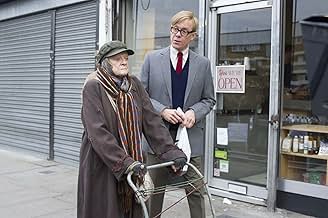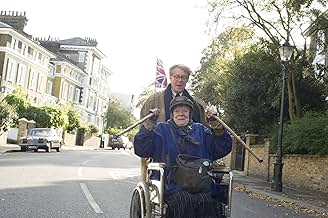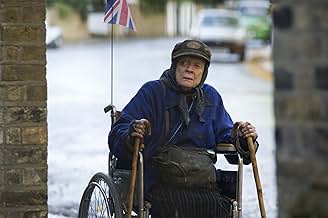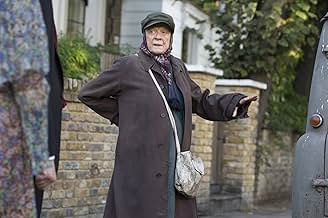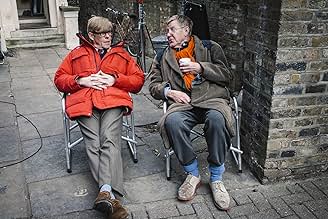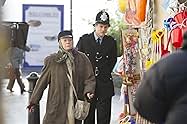IMDb-BEWERTUNG
6,7/10
33.556
IHRE BEWERTUNG
Ein Mann beginnt eine unerwartete Beziehung mit einer Frau, die in einem Van lebt, den sie in seiner Auffahrt parkt.Ein Mann beginnt eine unerwartete Beziehung mit einer Frau, die in einem Van lebt, den sie in seiner Auffahrt parkt.Ein Mann beginnt eine unerwartete Beziehung mit einer Frau, die in einem Van lebt, den sie in seiner Auffahrt parkt.
- Nominiert für 1 BAFTA Award
- 1 Gewinn & 8 Nominierungen insgesamt
Empfohlene Bewertungen
"Lady in the Van" from 2015 is the "mostly" true story of playwright Alan Bennett's relationship with a woman who lived in various vans parked in his driveway for fifteen years. Bennett here is played by Alex Jennings, and the lady, Miss Shepherd, Maggie Smith.
Miss Shepherd, who smells awful from not bathing, lives in a crowded van and moves it from place to place, staying until she's thrown out or until she hears music. When she's told to move or do something else, she yells, as only Maggie Smith can do, "I'm a sick woman! Dying possibly!" Alan finds it impossible to break from her, though he tries. She prays very fervently and one time tells him that she spoke to the Virgin Mary at the post office. When he asks if the van is insured, she says she doesn't need it, she's insured in heaven. "So what happens if you have an accident?" Alan asks. "Who pays? The Pope?"
Alan is gay, though his friends are always trying to fix him up with a woman. One day Miss Shepherd says, "All those people who come and go in the dark, I know who they are." "Oh, Jesus," he says under his breath. "They're Communists!" she hisses. "Otherwise they wouldn't come and go in the dark."
Miss Shepherd is a woman of mystery - Alan finally learns that she studied piano, speaks fluent French, and was a nun. She also at times is seen going to someone's house in the dead of night. A man opens the door and comes outside. And someone stops by her van from time to time, and she gives him money.
In the end, we learn who these people are, her story of the convent, the history of her piano-playing, why she prays all the time, and who the men are.
Alex Jennings is perfect as Bennett (who appears at the end of the movie). He has his voice down pat, and in the film, there are two Alans - the writer Alan and the observer Alan, who talk with one another throughout the film. It's Alan who lives in the real world who encourages the writer Alan to be helpful to Miss Shepherd.
I am so privileged to have seen Maggie Smith in "Lettice and Lovage," one of my greatest evenings in the theater, where I laughed until I cried. At the end of that play, she gets on the phone and does a serious, touching monologue. She does the same here. Instead of the crazy homeless lady with the plastic bags we see and laugh at and wonder about during the play, she does a monologue that tells us who she is, and about her pain, heartbreak, and disappointments. "Why did you choose to be homeless?" Alan asks. "I didn't choose," she insists. "It was chosen for me."
A wonderful film about an uptight, cold man and a disturbed religious bag lady - you won't soon forget it.
Miss Shepherd, who smells awful from not bathing, lives in a crowded van and moves it from place to place, staying until she's thrown out or until she hears music. When she's told to move or do something else, she yells, as only Maggie Smith can do, "I'm a sick woman! Dying possibly!" Alan finds it impossible to break from her, though he tries. She prays very fervently and one time tells him that she spoke to the Virgin Mary at the post office. When he asks if the van is insured, she says she doesn't need it, she's insured in heaven. "So what happens if you have an accident?" Alan asks. "Who pays? The Pope?"
Alan is gay, though his friends are always trying to fix him up with a woman. One day Miss Shepherd says, "All those people who come and go in the dark, I know who they are." "Oh, Jesus," he says under his breath. "They're Communists!" she hisses. "Otherwise they wouldn't come and go in the dark."
Miss Shepherd is a woman of mystery - Alan finally learns that she studied piano, speaks fluent French, and was a nun. She also at times is seen going to someone's house in the dead of night. A man opens the door and comes outside. And someone stops by her van from time to time, and she gives him money.
In the end, we learn who these people are, her story of the convent, the history of her piano-playing, why she prays all the time, and who the men are.
Alex Jennings is perfect as Bennett (who appears at the end of the movie). He has his voice down pat, and in the film, there are two Alans - the writer Alan and the observer Alan, who talk with one another throughout the film. It's Alan who lives in the real world who encourages the writer Alan to be helpful to Miss Shepherd.
I am so privileged to have seen Maggie Smith in "Lettice and Lovage," one of my greatest evenings in the theater, where I laughed until I cried. At the end of that play, she gets on the phone and does a serious, touching monologue. She does the same here. Instead of the crazy homeless lady with the plastic bags we see and laugh at and wonder about during the play, she does a monologue that tells us who she is, and about her pain, heartbreak, and disappointments. "Why did you choose to be homeless?" Alan asks. "I didn't choose," she insists. "It was chosen for me."
A wonderful film about an uptight, cold man and a disturbed religious bag lady - you won't soon forget it.
At the bottom of the poster it says: 'This is a mostly true story.' Nicholas Hytner directs a 'revisionist' take on Miss Shepherd, the tramp-like old biddy who parked her van in Alan Bennett's front drive for a few weeks that turned into 15 years. The movie version fleshes out her story with glimpses of her past (a convent, a piano recital, a family feud, a fatal accident) which the narrator (one of the two Alan Bennetts played by Alex Jennings) tells us he only found out after she died.
A woman in front of me whispered to her companion, who wondered why Alan Bennett had a twin, that he actually had a split personality. That's not a bad explanation for the device of the householder Alan who puts up with Miss Shepherd (and clears her mess from his drive) and the writer Alan who doesn't think there's a story in this. I'm not sure that the double-act is entirely effective or necessary: a voice-over from the real Alan would have worked just as well, wouldn't it?
Despite the attempts to give the Lady a life before the Van, the screenplay is more revealing about the playwright, the reluctant Samaritan who is also having to deal with his northern mother's journey down the road to dementia. There are even a few references to the fact that Mr Bennett's sexuality was being questioned for many years before he finally outed himself.
The movie has more pace than the book and the play did. Maggie Smith is of course simply magnificent, fully absorbed into the grimy skin of this unlovable old harridan. Her performance is pitched midway between the Duchess of Downton and Muriel from the Marigold Hotel, although the character preposterously blends Hyacinth Bucket with Victor Meldrew. The 'History Boys', who largely owe their careers to Mr Bennett, pop up in a series of cameos, along with Frances de la Tour and Stephen Campbell-Moore from the same play. Jim Broadbent's scrounger is the least convincing presence and is perhaps mostly untrue.
This looks like being another highly competitive year for Oscars and BAFTAs, but Dame Maggie is certain to be a contender and could well be a winner. THE LADY IN THE VAN is not pitch-perfect in the way that THE HISTORY BOYS was (and the first - best - MARIGOLD HOTEL), but it is another master-class exemplar of British writing, acting and film- making.
A woman in front of me whispered to her companion, who wondered why Alan Bennett had a twin, that he actually had a split personality. That's not a bad explanation for the device of the householder Alan who puts up with Miss Shepherd (and clears her mess from his drive) and the writer Alan who doesn't think there's a story in this. I'm not sure that the double-act is entirely effective or necessary: a voice-over from the real Alan would have worked just as well, wouldn't it?
Despite the attempts to give the Lady a life before the Van, the screenplay is more revealing about the playwright, the reluctant Samaritan who is also having to deal with his northern mother's journey down the road to dementia. There are even a few references to the fact that Mr Bennett's sexuality was being questioned for many years before he finally outed himself.
The movie has more pace than the book and the play did. Maggie Smith is of course simply magnificent, fully absorbed into the grimy skin of this unlovable old harridan. Her performance is pitched midway between the Duchess of Downton and Muriel from the Marigold Hotel, although the character preposterously blends Hyacinth Bucket with Victor Meldrew. The 'History Boys', who largely owe their careers to Mr Bennett, pop up in a series of cameos, along with Frances de la Tour and Stephen Campbell-Moore from the same play. Jim Broadbent's scrounger is the least convincing presence and is perhaps mostly untrue.
This looks like being another highly competitive year for Oscars and BAFTAs, but Dame Maggie is certain to be a contender and could well be a winner. THE LADY IN THE VAN is not pitch-perfect in the way that THE HISTORY BOYS was (and the first - best - MARIGOLD HOTEL), but it is another master-class exemplar of British writing, acting and film- making.
A very entertaining, and occasionally touching, film written by Alan Bennett, a British National Treasure - though I'm sure he must be irritated, if not sickened, by being so described. His unique voice is instantly recognisable: self-knowing, self-mocking, never ever self-regarding. In spite of a string of stage and screen successes, he is essentially a man of letters: there is a literary quality about his work, and a good deal of his humour emerges from the contrast between the elegance of his sentences and the earthy, realistic observations they contain.
Bennett adapted his memoir about Miss Shepherd, whose residence is the eponymous vehicle (one of a series of vehicles, as it turns out) that occupies his driveway for fifteen years, for the stage, which brought director Nicholas Hytner and actors Maggie Smith and Alex Jennings on to the project. All three return for this film version, and an excellent job they make of it.
Bennett slyly juggles a number of subplots without you ever really being aware that is what they are. When they are finally identified and tied up in a package, it feels a little too neat and tidy after all that sprawl - an interesting comparison is Charlie Kaufmann's bleaker vision of a writer's struggle with a piece of work, Synechdoche New York - but Bennett's droll dialogue, and his clear-sightedness over the way compassion intertwines with guilt, compensates for the sense of well-made screenplay that dominates the closing section of the film.
Highly recommended.
Bennett adapted his memoir about Miss Shepherd, whose residence is the eponymous vehicle (one of a series of vehicles, as it turns out) that occupies his driveway for fifteen years, for the stage, which brought director Nicholas Hytner and actors Maggie Smith and Alex Jennings on to the project. All three return for this film version, and an excellent job they make of it.
Bennett slyly juggles a number of subplots without you ever really being aware that is what they are. When they are finally identified and tied up in a package, it feels a little too neat and tidy after all that sprawl - an interesting comparison is Charlie Kaufmann's bleaker vision of a writer's struggle with a piece of work, Synechdoche New York - but Bennett's droll dialogue, and his clear-sightedness over the way compassion intertwines with guilt, compensates for the sense of well-made screenplay that dominates the closing section of the film.
Highly recommended.
Enjoyed it much more than I thought I would. Despite thinking very highly of Maggie Smith, Alex Jennings and Jim Broadbent et al, considering Alan Bennett a talented writer and liking previous work by Nicholas Hytner and George Fenton, the title was not particularly appealing to me, likewise with the subject matter based on a true story unfamiliar to me.
What a pleasant surprise though. Although not a great film and having its faults, 'The Lady in the Van' is a good film with a lot to like and perfect for a rainy day or wanting to let your hair down and relax in the evening. A strong example of not judging a film by its title. Whether 'The Lady in the Van' will garner a wide audience is hard to tell, it is very quintessentially British with a subject matter that perhaps a lot of people won't know much about to properly connect with and the script is written in a style that will work for some and not for others.
'The Lady in the Van' does have its flaws. The length of the film is longer than necessary for a story that is somewhat thin, meaning that there is some draggy pacing in the second half and some resolutions take too long to get there and feel too conveniently wrapped up.
On top of that, the ending, despite having a genuinely moving build-up, seemed to be an attempt at pathos and being uplifting but ended up feeling clumsy, confusing and almost like a cheat (almost like the rest of the film didn't happen). Jim Broadbent's scenes didn't work for me either, they just felt out of place in the film and jar tonally and while Broadbent is a great actor he isn't particularly memorable here.
However, 'The Lady in the Van' is beautifully filmed and handsomely produced, while George Fenton's music score is gentle and sometimes quirky and fits ideally with the film's mood. It also incorporates and arranges pre-existing classical music with ease, the use of Chopin's first piano concerto being the most striking and giving a real sense of pathos. There was the worry as to whether the humour would not feel right and do justice to a story that is quite tragic in a way.
No worries there. The script, with Bennett's style written all over it, is subversive, thought-provoking in how its messaging and what it's trying (and succeeds) to say is conveyed and full of very sharp scathing witticisms, do admit to laughing out loud a number of times. Hytner's direction is understated but always with a sense that he knows what he's doing and where to go.
Maggie Smith is truly magnificent here and worthy of some kind of award nod. Her character easily could have been an annoying caricature, especially in lesser hands, but Smith is often funny and deliciously batty but also gives the character a vulnerability. Alex Jennings is similarly marvellous and also deserving of award recognition, nailing Bennett's nuances, rhythm and how he speaks to a tee. The whole alter ego stuff is obvious early on and it is not always easy who is the real Bennett and who is the alter ego (only occasionally though), but that is in no way an issue, actually it was part of the fun. The chemistry between them is a joy and they work very well with the rest of the cast, who also do very well with some familiar and welcome faces.
On the whole, a very pleasant surprise and much better than expected. 7/10 Bethany Cox
What a pleasant surprise though. Although not a great film and having its faults, 'The Lady in the Van' is a good film with a lot to like and perfect for a rainy day or wanting to let your hair down and relax in the evening. A strong example of not judging a film by its title. Whether 'The Lady in the Van' will garner a wide audience is hard to tell, it is very quintessentially British with a subject matter that perhaps a lot of people won't know much about to properly connect with and the script is written in a style that will work for some and not for others.
'The Lady in the Van' does have its flaws. The length of the film is longer than necessary for a story that is somewhat thin, meaning that there is some draggy pacing in the second half and some resolutions take too long to get there and feel too conveniently wrapped up.
On top of that, the ending, despite having a genuinely moving build-up, seemed to be an attempt at pathos and being uplifting but ended up feeling clumsy, confusing and almost like a cheat (almost like the rest of the film didn't happen). Jim Broadbent's scenes didn't work for me either, they just felt out of place in the film and jar tonally and while Broadbent is a great actor he isn't particularly memorable here.
However, 'The Lady in the Van' is beautifully filmed and handsomely produced, while George Fenton's music score is gentle and sometimes quirky and fits ideally with the film's mood. It also incorporates and arranges pre-existing classical music with ease, the use of Chopin's first piano concerto being the most striking and giving a real sense of pathos. There was the worry as to whether the humour would not feel right and do justice to a story that is quite tragic in a way.
No worries there. The script, with Bennett's style written all over it, is subversive, thought-provoking in how its messaging and what it's trying (and succeeds) to say is conveyed and full of very sharp scathing witticisms, do admit to laughing out loud a number of times. Hytner's direction is understated but always with a sense that he knows what he's doing and where to go.
Maggie Smith is truly magnificent here and worthy of some kind of award nod. Her character easily could have been an annoying caricature, especially in lesser hands, but Smith is often funny and deliciously batty but also gives the character a vulnerability. Alex Jennings is similarly marvellous and also deserving of award recognition, nailing Bennett's nuances, rhythm and how he speaks to a tee. The whole alter ego stuff is obvious early on and it is not always easy who is the real Bennett and who is the alter ego (only occasionally though), but that is in no way an issue, actually it was part of the fun. The chemistry between them is a joy and they work very well with the rest of the cast, who also do very well with some familiar and welcome faces.
On the whole, a very pleasant surprise and much better than expected. 7/10 Bethany Cox
Like all the best English comedies, the humor in "The Lady in the Van" is founded on character and in eccentricity but then we should expect nothing less from the pen of the great Alan Bennett. This is mostly a true story we are told and it's the story of a very eccentric lady and one, or is it two, quite eccentric men. The lady is Mary, or is it Margaret, Shepherd who might be considered homeless were it not for the van she lives in. The somewhat eccentric man is Bennett himself. I said two because in this case we get two Bennetts for the price of one, Alan the writer and Alan the householder and they are both played by Alex Jennings.
Miss Shepherd really existed and she's the lady who, at Bennett's request. moved her van from the street outside his house, where she had parked it, into his driveway. Initially she was due to stay a few months but ended up parking there for 15 years. Bennett turned the story of her stay first into a novella and then into a play and now, under the direction of Nicholas Hytner, into a film and a beautiful job he's made of it.
Of course, for the purpose of dramatic and comic effect Mr Bennett has taken liberties, adding bits here and there including a delightful phantasmagorical ending. He also surrounds himself and Miss Shepherd with a host of other characters, some almost as eccentric as they are. Recreating the part she played on stage Maggie Smith is magnificent in the title role. Of course, you could say Maggie has been playing variations of Jean Brodie for the past 45 years. It's easy to see Miss Brodie in the put-downs of the Dowager, Countess of Grantham had Jean been born into a different generation or class and it's not much of a step to see Miss Shepherd as an older, very much down-on-her-luck Jean Brodie. A third Oscar is certainly not out of the question.
Jennings, too, has Bennett off to a tee and there's lovely support from the likes of Frances De La Tour, Roger Allam and Deborah Findlay as sundry neighbors while the entire cast of Bennett's "The History Boys" manage to pop up in one form or another. If it feels slighter than some of Bennett's other offerings it may simply be because here he is writing about someone we would probably pass in the street without looking twice at. Of course, if on meeting Miss Shepherd in the street we knew what we know now, we might indeed give her a second or even a third glance; we might even invite her to move her van into our driveway. Slight? Not a bit of it.
Miss Shepherd really existed and she's the lady who, at Bennett's request. moved her van from the street outside his house, where she had parked it, into his driveway. Initially she was due to stay a few months but ended up parking there for 15 years. Bennett turned the story of her stay first into a novella and then into a play and now, under the direction of Nicholas Hytner, into a film and a beautiful job he's made of it.
Of course, for the purpose of dramatic and comic effect Mr Bennett has taken liberties, adding bits here and there including a delightful phantasmagorical ending. He also surrounds himself and Miss Shepherd with a host of other characters, some almost as eccentric as they are. Recreating the part she played on stage Maggie Smith is magnificent in the title role. Of course, you could say Maggie has been playing variations of Jean Brodie for the past 45 years. It's easy to see Miss Brodie in the put-downs of the Dowager, Countess of Grantham had Jean been born into a different generation or class and it's not much of a step to see Miss Shepherd as an older, very much down-on-her-luck Jean Brodie. A third Oscar is certainly not out of the question.
Jennings, too, has Bennett off to a tee and there's lovely support from the likes of Frances De La Tour, Roger Allam and Deborah Findlay as sundry neighbors while the entire cast of Bennett's "The History Boys" manage to pop up in one form or another. If it feels slighter than some of Bennett's other offerings it may simply be because here he is writing about someone we would probably pass in the street without looking twice at. Of course, if on meeting Miss Shepherd in the street we knew what we know now, we might indeed give her a second or even a third glance; we might even invite her to move her van into our driveway. Slight? Not a bit of it.
Wusstest du schon
- WissenswertesThis movie was shot in the actual house on the street where the events took place, Gloucester Crescent in Camden Town. Some of the same people still lived there when the star prop arrived, decades later.
- PatzerMargaret/Mary is shown parking her new Commer van in the drive of Alan Bennett's house and she pulls up on the handbrake in the middle of the van, where a handbrake would normally be. In fact Commer vans had their handbrake to the right of the driver's seat between the seat and the door - not between the two front seats.
- Zitate
Rufus: Sorry, you can't park here.
Miss Shepherd: No, I've had guidance. This is where it should go.
Rufus: Guidance? Who from?
Miss Shepherd: The Virgin Mary. I spoke to her yesterday. She was outside the post office.
Rufus: What does she know about parking?
- Crazy CreditsDuring the first part of the credits, a young Margaret can be seen playing the piano at her concert in King's Hall.
- VerbindungenFeatured in Alan Bennett at 80: Bennett Meets Hytner (2014)
- SoundtracksPiano Concerto No. 1 In E Minor, OP. 11
Written by Frédéric Chopin
Performed by Clare Hammond and BBC Concert Orchestra
Orchestra Leader Charles Mutter
[The principal piano piece that recurs throughout the film is Chopin's Piano Concerto 1, using both the slow middle (second) movement "romanza" and the quick final (third) movement "rondo". Alfred Cortot was especially associated with playing Chopin's piano oeuvre.]
Top-Auswahl
Melde dich zum Bewerten an und greife auf die Watchlist für personalisierte Empfehlungen zu.
- How long is The Lady in the Van?Powered by Alexa
Details
- Erscheinungsdatum
- Herkunftsländer
- Offizieller Standort
- Sprachen
- Auch bekannt als
- Lady in the Van
- Drehorte
- 23 Gloucester Crescent, London, Greater London, England, Vereinigtes Königreich(Alan Bennett's house where the events actually occurred)
- Produktionsfirmen
- Weitere beteiligte Unternehmen bei IMDbPro anzeigen
Box Office
- Budget
- 6.000.000 $ (geschätzt)
- Bruttoertrag in den USA und Kanada
- 10.021.175 $
- Weltweiter Bruttoertrag
- 41.387.687 $
- Laufzeit1 Stunde 44 Minuten
- Farbe
- Sound-Mix
- Seitenverhältnis
- 1.85 : 1
Zu dieser Seite beitragen
Bearbeitung vorschlagen oder fehlenden Inhalt hinzufügen

Oberste Lücke
By what name was The Lady in the Van (2015) officially released in India in Hindi?
Antwort






